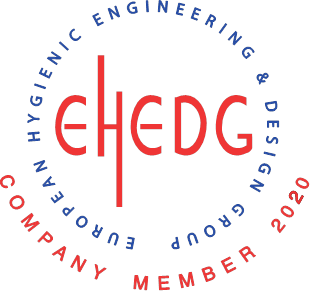Our Compliance Engineer Alwin de Bruine got this question. His answer: ‘Customers from the top end of the food industry were ahead of the curve in requesting EHEDG-certified magnetic separators. The market is becoming increasingly aware of the importance of hygienically designed process equipment. Good cleanability of equipment reduces the quantity of micro-organisms in their processes.
Alwin continues: Ultimately this extends the shelf life of the products. It also drastically reduces the chance of potentially very costly recalls and the associated reputation damage. These aspects are important for all foods, but especially for baby food and products that are highly susceptible to spoilage.’
Finish quality
‘It was not easy to meet the high finishing standards, but we ultimately succeeded. Food contact surfaces must be completely free of scratches and meet extremely high standards in terms of finish quality. There must not be any sharp corners or crevices in the magnet housing, because food products can be left behind there during the process and particularly during cleaning. The latter is the most important criterion. Therefore the hydro-formed housings of our EHEDG-certified equipment have no sharp angles and are fully drainable.’
Preventing claims and re-calls
‘First to be certified was the magnetic filter for liquids which can be wet cleaned (CIP or “clean-in-place”), and recently a clean flow magnet, suitable for dry cleaning was also certified. Getting the EHEDG certification was important, because it gives customers confidence in our products. After all, these products have been assessed and approved by a competent third party. This is also important when our customer must provide their own customers with guarantees and want to avoid claims and recalls.’
Hygienic design
‘With the EHEDG certification we have a leg up on the rest of the market. This is an advantage we want to retain. Therefore in the period ahead we will be putting even more time and energy into hygienic design and obtaining certifications for other products. We have had to expend considerable effort to consistently achieve the required high level of quality. Among other things, this has involved the implementation of comprehensive control steps with checklists in our production process and those of our subcontractors too. Components which do not meet all the requirements do not end up in the equipment. This enables us to guarantee the quality of our end products.’
EHEDG
Alwin explains what the acronym stands for: ‘European Hygienic Engineering & Design Group: a consortium of equipment manufacturers, food industries, research institutes and public health authorities promoting hygiene during processing and packing of food products.’
Compliance engineer Alwin de Bruine ensures that all magnetic systems comply with regulatory obligations and possibly other standards and customer requirements. He oversees this process and ensures that all the requirements are ultimately met. Alwin: ‘Manufacturers throughout the food industry are increasingly seeking a higher level of hygienic design, even in market segments where this has traditionally been considered less important. Dutch industry is at the forefront of the developments in this area.’
More information? Please use the contact form

